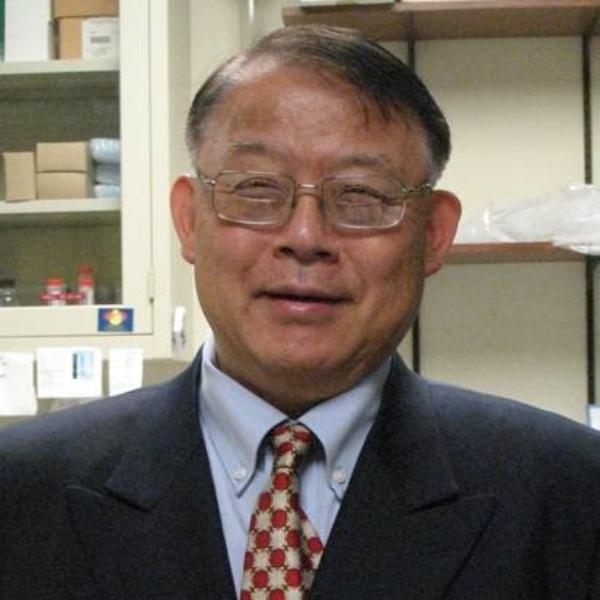
Joseph Wu, Ph.D.

Contact
Following a two-year post-doctoral training in biochemistry at Temple University, Joseph Wu, Ph.D., became a faculty member at NYMC in 1978, where he currently holds the rank of professor (with tenure) of biochemistry and molecular biology. At NYMC, Dr. Wu has trained 11 Ph.D. and 74 M.S. students. He has authored 237 peer-reviewed scientific articles, 29 reviews and book chapters and 143 abstracts.
Dr. Wu's lifelong goal is to make an impact on the quality of human life through research. To that end, Dr. Wu has been studying the biochemical, cellular and molecular changes that underlie heart disease and cancer to identify actionable targets for cardioprotection and chemoprevention.
Dr. Wu's early research at NYMC involved the characterization of IFN-inducible enzymes, dsRNA-dependent 2’,5’-oligoadenylate (25A) synthetase (25OAS) and the activation by 2-5A of RNase L. The next research focus of the Wu laboratory was the regulation of differentiation of granulocytes and monocyte/macrophages by vitamins A, D, and their derivatives, and by type 2 IFN, using cultured leukemia and prostate cancer cells. The Wu laboratory also studied the contribution of dsRNA-dependent activities in Alzheimer’s disease.
Education
- B.S. (Honors), Biochemistry, McGill University
- M.S., Chemistry, Florida State University
- Ph.D., Biological Sciences, Florida State University
- Post-grad, Biochemistry, Temple University
Honors and Awards
- NIH grant review panel on study section for Developmental Centers for Research (DCRC) in Complementary and Alternative Medicine, 2004
- NIH grant review panel on study section for Meetings and Networks for Methodological Development in Interdisciplinary Research, RM 04-014, 2004
- NIH grant review panel on study section for International Research Centers (ICRC) and Developmental Research Centers (DCRC) ZAT1DB-20, 2005
- Member of the Basic Science Review Panel, National Center for Complementary & Alternative Medicine, 2004-2009
- Chair, Review Panel on Training and Education, National Center for Complementary & Alternative Medicine Special Emphasis Panel, 2009-2014
Research
Dr. Wu's research in the past two decades has been on grape-derived polyphenol, resveratrol, which stems from data showing that resveratrol confers cardioprotection and exhibits anti-carcinogenic effects. An approach was developed to purify target proteins of resveratrol. By using resveratrol-immobilized affinity chromatography, combined with MALDI-TOF mass spectrometry and cloning, quinone reductase 2 (NQO2) was found to be a distinct target protein of resveratrol. Studies to define the role NQO2 plays on chemoprevention of prostate cancer by resveratrol are underway.
Publications
- Li J, Qi D, Hsieh TC, et. al. "Trailblazing perspectives on targeting breast cancer stem cells." Pharmacology & therapeutics, 223(), (2021) 107800. doi: 10.1016/j.pharmthera.2021.107800
- Wu Y, Hsieh TC, Wu JM, et. al. "Elucidating the Inhibitory Effect of Resveratrol and Its Structural Analogs on Selected Nucleotide-Related Enzymes." Biomolecules, 10(9), (2020) . doi: 10.3390/biom10091223
- Hsieh TC, Wu JM. "Resveratrol Suppresses Prostate Cancer Epithelial Cell Scatter/Invasion by Targeting Inhibition of Hepatocyte Growth Factor (HGF) Secretion by Prostate Stromal Cells and Upregulation of E-cadherin by Prostate Cancer Epithelial Cells." International journal of molecular sciences, 21(5), (2020) . doi: 10.3390/ijms21051760
- Hsieh TC, Chao HH, Wu JM, et. al. "Control of DNA structure and function by phytochemicals/DNA interaction: Resveratrol/piceatannol induces Cu(2+)-independent, cleavage of supercoiled plasmid DNA." Free radical biology & medicine, 147(), (2020) 212-219. doi: 10.1016/j.freeradbiomed.2019.12.034
- Hsieh TC, Wu JM. "Tumor PD-L1 Induction by Resveratrol/Piceatannol May Function as a Search, Enhance, and Engage ("SEE") Signal to Facilitate the Elimination of "Cold, Non-Responsive" Low PD-L1-Expressing Tumors by PD-L1 Blockade." International journal of molecular sciences, 20(23), (2019) . doi: 10.3390/ijms20235969
- Wang F, Zhou S, Qi D, et. al. "Nucleolin Is a Functional Binding Protein for Salinomycin in Neuroblastoma Stem Cells." Journal of the American Chemical Society, 141(8), (2019) 3613-3622. doi: 10.1021/jacs.8b12872
- Lucas J, Hsieh TC, Halicka HD, et. al. "Upregulation of PD‑L1 expression by resveratrol and piceatannol in breast and colorectal cancer cells occurs via HDAC3/p300‑mediated NF‑κB signaling." International journal of oncology, 53(4), (2018) 1469-1480. doi: 10.3892/ijo.2018.4512
Teaching Responsibilities
- Medical Biochemistry
- General Biochemistry Part I
- General Biochemistry Part II
- Biochemistry of Gene Expression
- Phytonutrients as Epigenetic and Metabolic Regulators of Cellular Functions in Normal and Disease States
- Novel Mechanisms in Protein Synthesis

